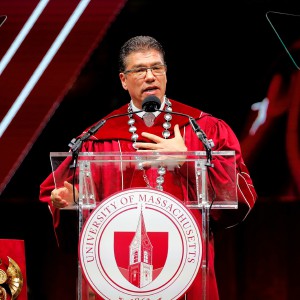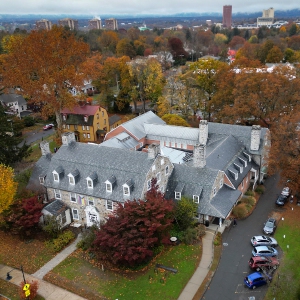UMass profs picked for new state climate science panel

The campus at the University of Massachusetts Amherst. Three professors are been selected by the state to serve on a new Climate Science Advisory Panel. file photo
| Published: 02-03-2024 10:56 AM |
AMHERST — Three faculty members at the University of Massachusetts are joining the state’s new Climate Science Advisory Panel, a group of 21 experts who will attempt to bridge the communication and knowledge gap between policymakers and scientists.
The UMass professors — David Boutt, Jon Woodruff and Robert DeConto — will contribute their expertise in snowfall, sea-level rise, water cycling and coastal sediment movement.
The panel is part of the new Massachusetts Office of Climate Science, formed in October.
Over the next year, the panel will provide each Massachusetts agency with up-to-date climate knowledge and projections and outline possible applications of climate science findings.
In 2025, the group of scientists will participate in topical climate science focus groups for each area of concern, such as coastal hazards, extreme heat or cold-water streams conservation.
The panel will also draft a State of the Climate Science Report, a document consisting of climate projections based on the current research and climate models.
“The university and the community should be proud of the leadership role of the faculty in state-related activities,” said Boutt, co-director of the UMass Environmental Science Program. “Sometimes we get lost a little bit in western Mass, but we have world-class researchers that are doing great work.”
Woodruff, the co-director of Northeast Climate Adaptation Center, said the creation of this panel is the natural next step in the center’s education and outreach. Previously, DeConto and Woodruff wrote reports for legislators on the most recent findings in coastal hazards and sea level rise. Woodruff said the panel will open a two-way form of communication, allowing policymakers to learn more about climate science and academics to focus their communication on the most important information for the public.
Article continues after...
Yesterday's Most Read Articles
“Having these reports co-produced between academics and members of the commonwealth is what we need right now,” Woodruff said.
Woodruff’s expertise lies in sedimentology, or the material that forms coastlines and coastal ecosystems like estuaries and salt marshes. He not only researches how rising sea levels alter movement of sediment and nutrients but also the effects extreme weather events like floods or large waves.
“We’re learning in real time how these types of systems are responding to the rate of sea-level rise, which we have not seen within our historical record,” Woodruff said. “But the time for action is also now, so science has to be moving forward in tandem with response. That takes a different type of science.”
Boutt researches the impacts of climate change on water cycling, specifically the movement of water below the surface to become groundwater and up to the surface to rejoin streams and rivers. As the state’s climate transitions to warmer, wetter weather and longer growing seasons, the amount, flow and demand for water in agriculture and drinking also changes. Boutt’s research involves these alterations.
DeConto’s primary research focus extends north to sea-level rise from shrinking ice sheets and glaciers. DeConto models the rate of this shrinkage and compares current size and rate of melting to previous eras of Earth with similar condition. He also investigates the impact of melting ice formations on sea level and coastal communities.
“Massachusetts is warming considerably faster than the national average, precipitation events are becoming more extreme, and our coastlines are experiencing accelerating sea level rise,” DeConto said in a press release. “Without thoughtful planning, these mounting environmental stressors will begin to push, and in some cases exceed, the limits of the Commonwealth’s adaptability, with negative and unequal impacts on our communities, economy, ecosystems and our collective future.”
The plan for an Office of Climate Science was outlined in ResilientMass Plan as an agency that supports other state agencies, municipalities and the public in understanding and using the state’s climate data.

 Sharing a few notes: High schoolers coaching younger string players one on one
Sharing a few notes: High schoolers coaching younger string players one on one Reyes takes helm of UMass flagship amid pro-Palestinian protests
Reyes takes helm of UMass flagship amid pro-Palestinian protests Sole over-budget bid could doom Jones Library expansion project
Sole over-budget bid could doom Jones Library expansion project Amherst poised to hire police department veteran as new chief
Amherst poised to hire police department veteran as new chief 